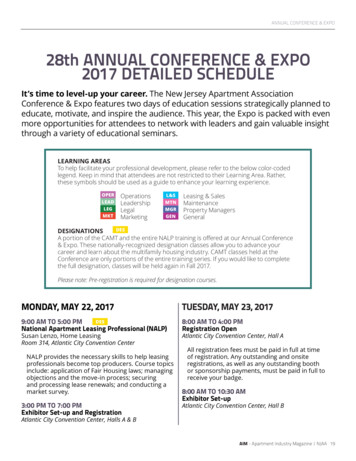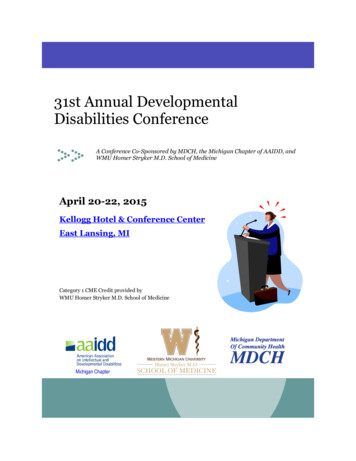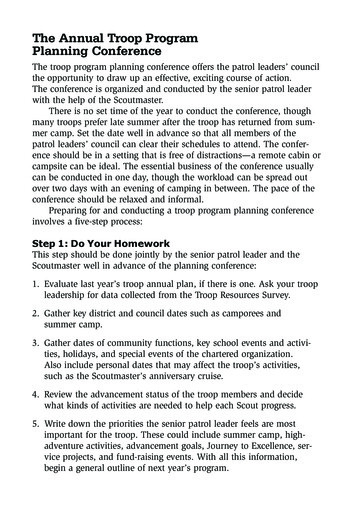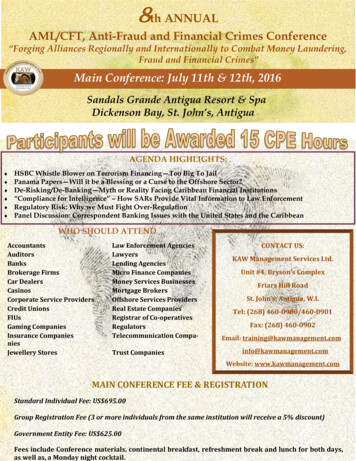
Transcription
NJABA’s 17th Annual ConferenceApril 1, 2022The Palace at Somerset ParkWifi: PalaceWiFiBrought to You by Our Platinum Sponsor
2021-2022NJABA BOARD OF DIRECTORSRobert LaRue, Ph.D., BCBA-DPresidentSungWoo Kahng, Ph.D., BCBA-DMaryLou Kerwin, Ph.D., BCBA-DPresident-ElectPast PresidentLindsay Keker, MAT, BCBAMeghan A. Deshais, Ph.D., BCBA-DSecretaryTreasurer/Finance ChairEric Eberman, M.S.EdPatrick Progar, Ph.D, BCBA-DGovernment Affairs ChairMembership ChairErin Richard White, Ph.D., BCBA-DCrystal A. Harms, M.Ed., BCBAEvents ChairContinuing Education ChairJason Vladescu, Ph.D., BCBA-D, NSCP, LBAJenna Glennon, M.A.T., BCBA(NY)Communications ChairUniversity Program LiaisonCraig Domanski, Ph.D., BCBA-DVanessa Bethea-Miller, M.A., BCBA, LBSService Delivery ChairRepresentative-At-LargeEmily Gallant, Ph.D., BCBA-DPierre Louis, M.S.Ed., THANK YOUNJABA would like to extend a huge thank youto our amazing volunteers for making today’s event happen!Event Committee Members: Melissa Connor-Santos, M.A., BCBA, Crystal A. Harms, M.Ed., BCBA, SandraR. Gomes, Ph.D., BCBA-D, Moshe Katz, M.A., BCBA, Pierre Louis, M.S.Ed., BCBA, Robert LaRue, Ph.D.,BCBA-D, Stephanie Summers, & Erin White, Ph.D., BCBA-DCommunications Committee: Amanda Austin, Psy.M., BCBA, Emily Gallant, Ph.D., BCBA-D, JennaGlennon, M.A.T., BCBA, Courtney Kane, M.A., Isabella Massaro, Psy.M., BCBA & Stephanie SummersSubmission Review Committee: Melissa Connor-Santos, M.A., BCBA, Craig Domanski, Ph.D., BCBA-D,Sandra Gomes, Ph.D., BCBA-D, Adrienne Jennings, Ph.D., BCBA-D, Courtney Kane, M.A., BCBA, MaryLouKerwin, Ph.D., BCBA-D, Robert LaRue, Ph.D., BCBA-D, Pierre Louis, M.S.Ed., Allison Parker, M.A., BCBA,Patrick Progar, Ph.D, BCBA-D, & Erin White, Ph.D., BCBA-DNJABA’s Executive Director, Stephanie Summers1
JOIN THE NJABA BOARD OF DIRECTORSThe NJABA Board is soliciting letters of interest for Board-appointedpositions! All interested full members are encouraged to apply. Letters ofinterest should include the following information: Why you are seeking the positionThe experiences you would bring to the positionYour abilities to fulfill the responsibilities of the positionEstimated hours per month availableYour nameYour email addressYour phone numberYou would be applying to join a great team! NJABA's associationmanagement firm provides administrative support for these positions, andcommittee members help as well. Board meetings occur monthly.Appointments are for two years, unless otherwise noted.Positions Open July 1, 2022Communications ChairOversee website content and social mediaUniversity Program LiaisonServe as a two-way communication mechanism between NJABA anduniversity programsMembership ChairEngage and increase membershipLetters will be accepted until May 9, 2022, and members will beinformed in late May 2022.Interested and have questions?Send inquiries and letters of interest to: info@njaba.org2
3
2022 NJABA CONFERENCE Keynote(2 CEUS)Posters &Exhibitors7:00 – 8:00Session 1(1.5 CEUs)LunchSession 2(1.5 CEUs)Session 3(1 CEU)Session 4(1 and FoyerPresidential Address: Robert LaRue, Ph.D., BCBA-DEast Ballroom (1st FL)Keynote Address: Shahla Ala'i-Rosales, Ph.D., BCBA-D, LBAEast Ballroom (1st FL)(Ethics)PostersEast Ballroom (1st FL)9:55-10:30ExhibitorsWest Ballroom (1st FL)Workshop 1: Increasing Cultural Responsiveness in the Practice ofEast Ballroom (1st FL)Behavior Analysis (Supervision)Symposium 1: Improving Employment Outcomes in AdolescentsWest Library (1st FL)and Adults with Autism Spectrum Disorders10:30-11:45 Workshop 2: Behavioral Strategies for Management of ADHDGatsby's (2nd FL)Symptoms in School-age ChildrenWorkshop 3: Practical Ethics for Behavior Analysts (Ethics)NW Ballroom (1st FL)Symposium 2: Being Prepared for the Unexpected: The RoleLecture Suite (2nd FL)System Variables in Autism Intervention Programs PlayEast Ballroom (1st FL)11:45-12:45 Select workgroups will have designated lunch tablesWorkshop 4: The Black Book of Supervision: All Secrets RevealedEast Ballroom (1st FL)(Supervision)Panel 1: Using OBM to Engage Employees and Increase RetentionWest Library (1st FL)in a Behavior Analytic Organization (Ethics)Workshop 5: AAC Intervention Strategies for Individuals with ASDGatsby's (2nd FL)12:45-2:00 Symposium 3: Current Trends of Trial-Based Functional Analysis,Abduction & Sexual Abuse Prevention, & Telehealth-BasedNW Ballroom (1st FL)ResearchWorkshop 6: Dissemination & Implementation of the PracticalFunctional Assessment & Skills-Based Treatment Process inLecture Suite (2nd FL)Home-based Settings: Lessons LearnedWorkshop 7: Shaping Future Behavior Analysts: Reimagining theEast Ballroom (1st FL)Framework of BCBA Supervision (Supervision)Panel 2: Addressing Ethical Dilemmas for the Behavior Analyst: AnInteractive Panel Discussion of Ethics Using Video RecordedWest Library (1st FL)Scenarios (Ethics)2:10-3:00 Workshop 8: Structuring Social Skill Development Groups toGatsby's (2nd FL)Promote Pro-Social BehaviorSymposium 4: Checks and Balances: Perspectives on SupervisionNW Ballroom (1st FL)and Leadership in ABA Organizations (Supervision)Workshop 9: The Application of Applied Behavior Analysis toLecture Suite (2nd FL)Health CoachingPanel 3: School Consultations: Administrative and ClinicalEast Ballroom (1st FL)Perspectives on Optimizing Outcomes (Supervision)Symposium 5: Research & Ethical Considerations on the Use ofWest Library (1st FL)Restraint & Physical Behavior Management Across Settings Ethics)Workshop 10: How to Use Behavior Analysis to be an EffectiveGatsby's (2nd FL)3:10-4:00Communicator on an IEP TeamWorkshop 11: Structured Supervision & Mentoring for SmallNW Ballroom (1st FL)OrganizationsWorkshop 12: From BCBA to Business Leader: Teaching ClinicalLecture Suite (2nd FL)Experts to Drive Business Goals8:15-9:554
NJABA 2022 KEYNOTE SPEAKER8:15am-9:55amCaring Hearts at the Intersection ofAutism and CultureAbstract: What are the relations between science, ethics andprogress in Applied Behavior Analysis? How does this relate toAutism? To explore this question, we look at the progression ofintensive interventions in autism. This will include: an overview ofthe changing foundational premises of our discipline; theemergence, impact and metamorphosis of early interventionconfigurations; the rapid expansion of services and serviceproviders; and the concerns voiced by people of color and autisticpeople. The proliferation of behavior analysis in autism services hasbrought both growth and growing pains. When facing the painfuldimensions of growth, we can either choose to be complacent orhumbly act to progress as an applied science that cares deeply forthe people we serve. Concepts complementary to our science, suchas social justice, care ethics and womanism, can offer meaningfulways to strengthen our caring hearts to honor individual and thecollective.Learning objectives: At the conclusion of the presentation, participants will be able to:1. To identify the relations between science, ethics and progress in ABA.2. To identify growth and growing pains.3. To identify probable outcomes of different actions in the face of rapid growth.4. To identify resources for advancing caring and progressive scientific practices in ABA.Shahla Ala'i-Rosales, Ph.D., BCBA-D, LBA received her B.S. from Southern Illinois University and her M.A.and Ph.D. from the University of Kansas. She is an Associate Professor in the Department of BehaviorAnalysis at the University of North Texas. Shahla and her students collaborate with community partnersto serve people who are under resourced and marginalized within current societal structures. Shahla is amember of an interdisciplinary lab that includes faculty and students from Woman’s and Gender Studies,Applied Anthropology and Behavior Analysis. Shahla teaches courses on technology transfer, ethics,autism intervention, parent training, behavioral systems, applied research methods, behavior changetechniques, and assessment. Shahla has served on several boards and disciplinary committees, mostnotably the BACB Board of Directors, the ABAI Practice Board, the ABAI Diversity, Equity and InclusionBoard and the OAR Scientific Council. She has published and presented research on social justice, ethicsin early intervention, play and social skills, family harmony, change agent training, supervision and therelationship between love and science in the treatment of autism. She co-authored a book on supervisionand mentoring and another on responsibility and responsiveness in the parenting and autism. Shahla hasover four decades of experience working with families and has trained hundreds of behavior analysts. Shewas awarded an Onassis Foundation Fellowship for her work with families, was the recipient of UNT’sprestigious “’Fessor Graham” teaching award, received the 2019 Texas Association for Behavior AnalysisCareer Contributions award, and the UNT 2020 Community Engagement award.5
POSTER SESSION & EXHIBIT HALL9:55am-10:30amPosters Presentations(rear of East Ballroom)#1 Acquisition of Observed Operants and Group Participation as a Function of a Dependent Group Contingency: Lauren Baldonado, Ph.D.,BCBA-D, Lauren Shapiro, M.A., BCBA, & Alyssa Barrall, M.A.#2 Systematic literature review of self-monitoring to increase physical fitness for adolescents and adults with developmental disabilities:Norelle Bondar, M.A., BCBA, & Allison Parker, M.A., BCBA#3 Using self-monitoring to increase rates of instruction using Precision: Hillary Genovese, M.A., BCBA, Aubrey Byrne, M.A., BCBA, TiffaniSwanda, M.A., RBT, Christine Barosky, M.A., BCBA, & Lauren Kryzak, Ph.D., BCBA-D#4 Teaching a Learner with Sophisticated Verbal Skills Appropriate Alternatives to Low-Frequency, High-Intensity Undesired Behaviors:Sandra R. Gomes, Ph.D., BCBA-D, Jessica M. Lamb, B.A., Emily E. Gallant, Ph.D., BCBA-D & Kevin J. Brothers, Ph.D., BCBA-D#5 A Preliminary Evaluation of Protests and Function Identification during Functional Analyses: Christian Grant, B.A., Olivia Scattergood,B.A., RBT, Jenna Richards, B.A., RBT, Giovanna Salvatore, M.A., & Christina Simmons, Ph.D., BCBA-D#6 A Pilot Evaluation of a Supplemental Curriculum on Diversity Content in Graduate Course Syllabi: Stephanie M. Ortiz, M.A., BCBA, MelissaA. Joseph, M.Ed., BCBA, & Meghan A. Deshais, Ph.D., BCBA-D#7 Individualized Curricula for Teaching Foundational Reading Comprehension Skills to Learners with Autism: Priya Patil, M.A., BCBA,Catherine Collins, M.A., BCBA, Cassandra McGuirl, B.A., Amber Trinidad, B.A., Emily E. Gallant, Ph.D., & BCBA-D & Kevin J. Brothers, Ph.D.,BCBA-DVisit Our Exhibit Hall located in theGrand Foyer and West BallroomACEAnderson Center for AutismAutism NJBancroftBehavior Development SolutionsBethea-Miller Behavioral ConsultingBrett DiNovi & Associates, LLCCentral ReachCommunity Access UnlimitedData Group CentralGeorgian Court UniversityHelping Hands FamilyKyoMedical Billing ManagementPBS CorporationPeak Center for AutismRCAASSeton Hall UniversitySt. Elizabeth UniversityThe Uncommon ThreadThinkPsychWellspan6
SESSION 1 PRESENTATIONS10:30am-11:45pmWorkshop #1 (East Ballroom-1st Fl): Increasing Cultural Responsiveness in the Practice of Behavior Analysis (1.5Supervision CEUs)Cultural competence is the ability to understand, appreciate and interact with people from cultures or belief systems different from one'sown. When practitioners who incorporate cultural competence into treatment, it may lead to improved outcomes, increased clientsatisfaction, and motivates clients to be equal partners within their care/clinical team. Increasing cultural understanding and diversity inApplied Behavior Analysis is critical to culturally responsive treatment. Ethics Code for Behavior Analysts, updated January 1st, 2022 includes(1.07) Cultural Responsiveness and Diversity. Some example of increasing cultural competence into practice is to consider various culturalpractices as you conduct assessment such as self-care, feeding, sleep, toileting, etc. Goals targeted for both and increase and decreaseshould be aligned with the client and familyâ s values. This addresses aspects of social validity as well. Furthermore, CulturalResponsiveness Classroom Management provides all students with equitable opportunities for learning classroom management in theservice of social justice. Cultural responsiveness can be applied when treating behaviors targeted for increase and decreas and duringsupervision.Presenter: May Chriseline Beaubrun, M.Ed., BCBA, LBA (Brett DiNovi & Associates)Symposium #1 (West Library-1st Fl): Improving Employment Outcomes in Adolescents and Adults with AutismSpectrum Disorders (1.5 General)The ability to obtain and maintain employment represents a critical developmental step in the lives of most people. While gainfulemployment provides us with the means to live independently, there are benefits that extend beyond simply getting a paycheck.Employment provides us with an opportunity to develop social relationships with the people with whom we work. These interactions allowus to develop social skills, expand our social network, and feel as though we are a part of a broader community. Gainful employment canalso enhance our productivity and provide people with a sense of purpose. While those of us who are “neurotypical” usually find and sustainemployment without much difficulty, employment outcomes for people with autism spectrum disorder (ASD) are generally poor. In fact,estimates indicate that approximately 50% to 75% of adults with ASD are unemployed (Bush & Tassé, 2017; Howlin et al., 2004). The purposeof the current symposium is to share novel assessment and intervention strategies to help improve these employment outcomes. Thesymposium will conclude with a discussion about short and long term goals for improving outcomes for individuals with developmentaldisabilities and autism spectrum disorders.Chair: Robert H. LaRue, Ph.D., BCBA-D (Rutgers University)Discussant: James Maraventano, Ed.D., BCBA-D (Rutgers University)Accounting for Environmental and Task-Specific Factors for Improving Employment Matching for Adolescents and Adults with ASD:Jenna Budge , LSW, BCBA (Rutgers University/DDDC), Robert H. LaRue, Ph.D., BCBA-D (Rutgers University), James Maraventano, Ed.D.,BCBA-D (Rutgers University/RCAAS), Todd Frischmann, Ed.M., BCBA (Rutgers University/DDDC), Caitlin Kehoe, Ed.M., BCBA (RutgersUniversity/DDDC), & SungWoo Kahng, Ph.D., BCBA-D (Rutgers University)Evaluation of Vocational Video-Based Preference Assessments for Adolescents with Autism Spectrum Disorder: Courtney Kane, M.A.,BCBA (Caldwell University), Ruth DeBar, Ph.D., BCBA-D (Caldwell University), Tina M. Covington (Anderson Center for Autism), & MeghanA. Deshais (Rutgers University)Discriminating Relationship Types to Improve Socially Acceptable Statements Made by Adults with Autism: Whitney PubylskiYanofchick, MSW, BCBA (Rutgers University/RCAAS)Workshop #2 (Gatsby's-2nd Fl): Behavioral Strategies for Management of ADHD Symptoms in School-ageChildren (1.5 General CEUs)Attention-Deficit Hyperactivity Disorder (ADHD) is a disorder characterized by symptoms of inattention and/or hyperactivity. According toNIMH, ADHD is relatively common in the United States with a prevalence of 11% among school age children. Hyperactivity/impulsivitysymptoms include talking excessively, difficulty waiting, and excessive movement. Inattentive ADHD symptoms include difficulty sustainingattention, deficits in organizational skills, losing things necessary for work/activities, and forgetfulness. In this workshop, we will reviewcommon challenges that children with ADHD experience at home and in school. Recent research on behavioral interventions for ADHD willbe discussed with a focus on teaching behavioral strategies that could be implemented by behavioral analysts working I clinic, home, andschool settings. These strategies include contingency management, programmed reminders, and organizational skills training for improving7
functioning. Behavioral strategies will be demonstrated through the use of extensive clinical case examples. Interactive learning withparticipants volunteering their own case examples will be encouraged.Presenters: Anton Shcherbakov, Psy.D, BCBA (The Center for Emotional Health & ThinkPsych) & Rebecca Schulman,Psy.D, BCBA-D (Behavior Therapy Associates & ThinkPsych)Workshop #3 (NW Ballroom-1st Fl): Practical Ethics for Behavior Analysts (1.5 Ethics CEUs)On January 1, 2021, the Ethics Code for Behavior Analysts will replace the Ethical Compliance Code for Behavior Analysts as theCode which guides the professional activities of behavior analysts over whom the BACB has jurisdiction. This workshop will focuson those changes as well as practical applications of the Code of Ethics to issues commonly occurring in the delivery of behavioranalytic services to vulnerable populations; how to use the Ethics Code to identify which issues are of ethical nature, whichstandards apply to each scenario, and steps to take to address it professionally. Participants will practice using a systematicdecision making approach to scenarios, explaining their analyses and decisions, and role-play communication with partiesinvolved in the scenarios.Presenters: Daniela Fazzio, Ph.D., BCBA-D (Alpine Learning Group) & Jaime A. DeQuinzio, Ph.D, BCBA-D (AlpineLearning Group)Symposium #2 (Lecture Suite-2nd Fl): Being Prepared for the Unexpected: The Role System Variablesin Autism Intervention Programs Play (1.5 General)Autism intervention programs have a number of responsibilities; however, the most important responsibility is to provideeffective intervention to the individuals served to produce meaningful outcomes for them and their families. Programs thatoperate from the science of behavior analysis, and consistently implement systems that ensure the organization operatessuccessfully at every level, are far more effective in producing positive outcomes under varied conditions. The pandemic, thatwe all faced over the last two years, provided an opportunity to test and analyze the efficacy, and strength, of the systemsproposed by McClannahan and Krantz (1993). The papers in this symposium will focus on system variables that promotedcontinued student skill acquisition, staff development, and parent support and mentorship through a number of unexpected andunusual conditions. Each presenter will share relevant data that have been collected across a number of agencies, nationally andinternationally, to support the value of systems and their role in ensuring generalized outcomes under novel conditions. The dataobtained during the pandemic period provide us with an opportunity to analyze those system variables and promote thecontinued use of organizational systems in autism intervention programs.Chair: Dawn B. Towsend, Ph.D., BCBA-D (Alliance for Scientific Autism Intervention)Ensuring Student Progress During the Pandemic: Susan M. Vener, Ph.D., S.A.S. (New York Child Learning Institute) &Alison Gillis, Ph.D. , BCBA-D (New York Child Learning Institute)Staff Training and Evaluation during the Pandemic: Important Lessons Learned: Kevin J. Brothers, Ph.D., BCBA-D(Somerset Hills Learning Institute), Paul Shreiber, MA (Somerset Hills Learning Institute), & Emily Gallant, Ph.D., BCBAD (Somerset Hills Learning Institute)Parent Support and Mentorship under Highly Variable Conditions: Christine M. Fry, M.Ed. (Princeton ChildDevelopment Institute), Amanda S. Freeman, Ph.D., BCBA-D (Princeton Child Development Institute), & Gregory S.MacDuff, Ph.D., BCBA-D (Princeton Child Development Institute)Lessons Learned About System Implementation Under Unplanned and Unique Conditions: Eric Rozenblat, Ph.D.,BCBA-D (Institute for Educational Achievement), Donna DeFeo, Ph.D. (Institute for Educational Achievement), & DawnB. Townsend, Ph.D., BCBA-D (Institute for Educational Achievement)8
9
LUNCH BREAK11:45am-12:45pmVisit our exhibit hallWorkgroup Meet & GreetsHave lunch with a workgroup you belong to or sit with a new one to find out what they’re all about.Look for the designated tables in the East Ballroom for the following workgroups:Adult ServicesDiversity & InclusionInsurance, Medicaid, and Business PracticesEarly Intervention10
SESSION 2 PRESENTATIONS12:45pm-2:00pmWorkshop #4 (East Ballroom-1st Fl): The Blackbook of Supervision: All Secrets Revealed (1.5 Supervision CEUs)It is the responsibility of every ABA supervisor to provide efficacious supervision to current and prospective certificants (BACB, 2014). TheABA Supervision Handbook offers a systematic method for training professional behavior analysts to acquire clinical competency. Inaddition, it provides a means to evaluate ongoing supervisee performance of the skills listed within the 5th edition task list. In doing so,The ABA Supervision Handbook allows for the identification of supervisees’ mastered skills and areas of improvement, helps to structurethe supervision experience and operationalize the practice of supervision, provides competency-based measures, and helps fulfill thesupervisor's duty to develop ethical and data-based decision-making systems (4.06; BACB, 2020). As a result, organizations and individualswill benefit from improved supervisory practices and training competent, ethical practitioners. This workshop will therefore focus onteaching participants how to use the Handbook to structure, train, and evaluate supervisees’ experiences, including the presentation ofscenarios to practice using the competency and ethical decision-making instruments.Presenters: Hana Jurgens, MS, BCBA, LBA(MI) (Positive Behavior Supports, KHY ABA Consulting Group, Inc.), Karly Cordova, EdD,BCBA-D, LABA (MA) (KHY ABA Consulting Group, Inc.), & Yulema Cruz, PhD, BCBA-D (Rutgers University, KHY ABA Consulting Group,Inc.)Panel #1 (West Library-1st Fl): Using OBM to Engage Employees and Increase retention in a Behavior AnalyticOrganization (1.5 Ethics)In an industry where organizations often struggle with retention, employee engagement seems to be the proverbial Unicorn pursued bymany yet found by few. Operationalized by Ludwig and Frazier (2012) as value-added behavior that is reinforced, engagement is easy topronounce, yet challenging to produce. Engaging employees requires precise, purposeful, and systematic approaches on the part ofleadership in order to increase committed employees and worthy performance reflective of an organization’s values and mission. Thispanel will discuss strategies for increasing employee engagement and retention through strategies grounded in Organizational BehaviorManagement and in alignment with the ethical guidelines of the Behavior Analyst Certification Board (BACB).Chair: Patrick R. Progar, Ph.D., BCBA-D (Brett DiNovi & Associates)Panelists: Paul "Paulie" Gavoni, Ed.D., BCBA, Brett DiNovi, MA, BCBA (Brett DiNovi & Associates), Jason Golowski, MA, BCBA (BrettDiNovi & Associates), & Lisa Riley, RBT (Brett DiNovi & Associates)Workshop #5 (Gatsby's-2nd Fl): AAC Intervention Strategies for Individuals with Autism (1.5 General CEUs)AAC will be reviewed for its benefits for expressive and receptive language (Light et al., 1998). Research-based information is provided as itrelates to how vocal speech development is affected by AAC (Olive et al., 2007). Communication modes, the range of communication systems(low tech to high tech), and brief information related to assessment is reviewed. Research on the efficacy of speech-generating devices forsupporting communication needs of individuals with autism will be explicitly reviewed. Information regarding recommendedprompts/prompt-fading procedures will be shared (Feeley & Jones, 2012). Steps for initiating intervention and selecting initial vocabularyare reviewed (Rosales, Stone, & Rehfeldt, 2009). Considerations for implementing FCT as it relates to AAC are reviewed (Carr & Durand,1985). Addressing AAC needs for learners with partial vocal speech is addressed and a sample protocol is shared. AAC modeling techniquesare reviewed in detail (Harris & Reichle, 2004). Additional strategies for common challenges with AAC intervention are discussed. Specificskill acquisition programs to target skills such as communicative repair will be shared.Presenter: Joseph A. Novak, EdD, BCBA-D, CCC-SLP, ATP (REED Autism Services, Kean University, Endicott College, Private Practice)Symposium #3 (NW Ballroom-1st Fl): Current Trends of Trial-Based Functional Analysis, Abduction and SexualAbuse Prevention, and Telehealth-Based Research (1.5 General)Teaching safety skills, reducing problem behavior, and access to remote behavior analytic services is critical to the autonomy and to thetrajectory of individuals with autism and related disorders. Specifically, abduction and sexual abuse prevention is important for independentaccess to the community. Alternative functional analysis methodologies, like trial-based functional analyses, that assess environmentalvariables maintaining problem behavior in the natural setting are needed. Additionally, continued access to intervention in the face ofservice disruption and for those who lack immediate access to service providers may benefit from telehealth-based services. Researcherscontinue to evaluate these practices across participant characteristics, dependent measures, and settings as new questions, considerations,and challenges (e.g., pandemics) arise. Syntheses of current and past research can guide practitioners to identify best practices and gaps in11
research. The purpose of the symposium is to systematically review abduction and sexual abuse prevention, trial-based functional analyses,and telehealth research to identify strengths, best practices, limitations, and areas of future research.Chair: Ruth M. DeBar, Ph.D., BCBA-D (Caldwell University)The Use of Telehealth in Interventions with Individuals with Autism Spectrum Disorder: A Descriptive Review: Courtney L. Kane,M.A., BCBA (Caldwell University), & Ruth M. DeBar, Ph.D., BCBA-D (Caldwell University)Abduction and Sexual Abuse Prevention by Individuals with Developmental Disabilities: A Review of the Literature: Melina Morel,M.A., BCBA (Caldwell University), Ruth M. DeBar, Ph.D., BCBA-D (Caldwell University), Jason C. Vladescu, Ph.D., BCBA-D (CaldwellUniversity), & Sharon A. Reeve Ph.D., BCBA-D (Caldwell University)A Descriptive Assessment of the Trial-Based Functional Analysis: Jessica L. Amador, M.A., BCBA (Caldwell University), Ruth M. DeBar,Ph.D., BCBA-S (Caldwell University), Tina Sidener, Ph.D., BCBA-D (Caldwell University), Meghan A. Deshais, Ph.D., BCBA-D (RutgersUniversity), & Andrew W. Gardner, Ph.D., BCBA-D (University of Arizona)Workshop #6 (Lecture Suite-2nd Fl): Dissemination and Implementation of the Practical Functional Assessment(PFA) and Skills-Based Treatment (SBT) Process in Home-based Settings: Lessons Learned (1.5 General CEUs)Conducting functional analyses (FAs) can help identify effective function-based treatment to addressing problem behaviors. The FA literaturehas extensively cited Iwata et al.’s (1982) format and procedures. More recently, published studies have shifted away from the Iwata’sstandardized procedures and included the use of open-ended interviews, matched control and test conditions, synthesized contingencies toemulate the establishing operations suspected in the participant’s natural environment, and the inclusion of non-dangerous topographiesof problem behaviors (Jessel et al., 2020). Hanley et al. (2014) presented an assessment process that consists of a practical functionalassessment, including an open-ended interview, and an experimental analysis (the Interview-Informed Synthesized Analysis or IISCA) usingone control condition and one test condition with synthesized establishing operations. In this workshop, attendees will learn how oneservice provider agency made the shift to implementing these procedures in client’s homes. Discussion will include barriers toimplementation, a compassionate approach to collaborating with families, preparation considerations, staff training and support, andteaching from joy.Presenters: Celia Heyman, M.A., BCBA (Above & Beyond Learning, FTF Behavioral Consulting, Capella University), Laura Lyons, PhD,BCBA-D (Above and Beyond Learning Group), & Alexis Bondy, MSEd (Above and Beyond Learning Group)12
SESSION 3 PRESENTATIONS2:10pm-3:00pmWorkshop #7 (East Ballroom-1st Fl): Shaping Future Behavior Analysts: Reimagining the Framework of BCBASupervision (1 Supervision CEUs)Fieldwork for board certified behavior analyst (BCBA) certification has continued to become more rigorous over time. With the exponentialgrowth of the field, the quality and experience of supervisors can vary greatly, particularly in settings that lack university affiliations. As aresult of many factors to be discussed, uneven development of behavior analytic repertoires occurs across the field while fieldwork remainshighly variable. This paper proposes a model that incorporates previous recommendations for supervision (e.g. contracts, establishingexpectations), as well as additional behavior analytic principles to create a fieldwork sequence. The three-part sequence starts with fluencywith direct care skills ensuring pre-requisites are met early. Next, a clinically applied project embeds motivating operations, selfmanagement and behavior analytic professionalism. Finally, the third phase focuses on mentorship from a current BCBA utilizing a jobmodel for training. Threaded throughout this framework are competencies, behavioral skills training, opportunities for feedback, task listconnections and suggestions to ensure all standards are closely adhered to as a trainee progresses. The further dissemination andadaptation of a framework such as this can support the continued push
6 POSTER SESSION & EXHIBIT HALL 9:55am-10:30am Posters Presentations (rear of East Ballroom) #1 Acquisition of Observed Operants and Group Participation as a Function of a Dependent Group Contingency: Lauren Baldonado, Ph.D., BCBA-D, Lauren Shapiro, M.A., BCBA, & Alyssa Barrall, M.A. #2 Systematic literature review of self-monitoring to increase physical fitness for adolescents and adults with .










